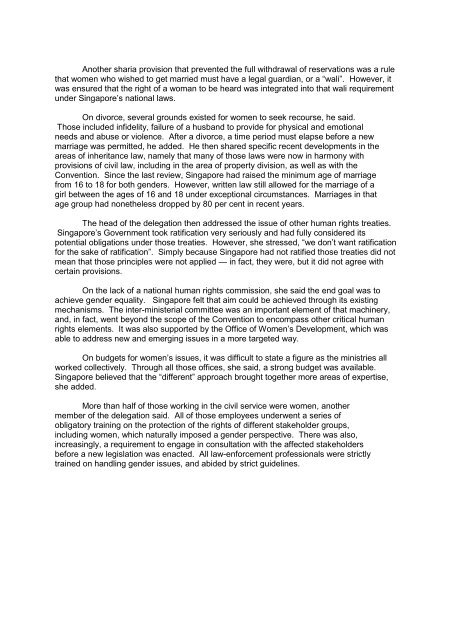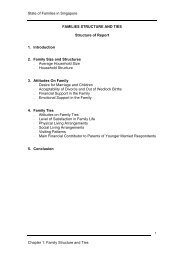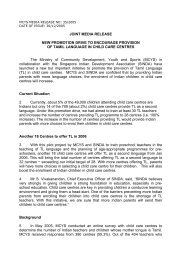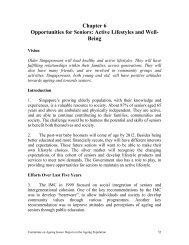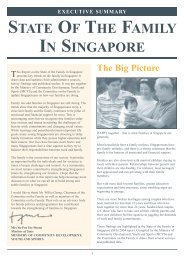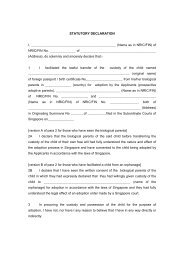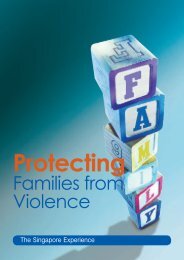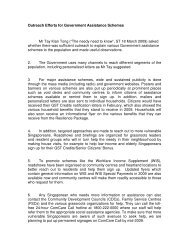Another sharia provision that prevented the full withdrawal <strong>of</strong> reservations was a rulethat women who wished to get married must have a legal guardian, or a “wali”. However, itwas ensured that the right <strong>of</strong> a woman to be heard was integrated into that wali requirementunder Singapore’s national laws.On divorce, several grounds existed for women to seek recourse, he said.Those included infidelity, failure <strong>of</strong> a husb<strong>and</strong> to provide for physical <strong>and</strong> emotionalneeds <strong>and</strong> abuse or violence. After a divorce, a time period must elapse before a newmarriage was permitted, he added. He then shared specific recent developments in theareas <strong>of</strong> inheritance law, namely that many <strong>of</strong> those laws were now in harmony withprovisions <strong>of</strong> civil law, including in the area <strong>of</strong> property division, as well as with theConvention. Since the last review, Singapore had raised the minimum age <strong>of</strong> marriagefrom 16 to 18 for both genders. However, written law still allowed for the marriage <strong>of</strong> agirl between the ages <strong>of</strong> 16 <strong>and</strong> 18 under exceptional circumstances. Marriages in thatage group had nonetheless dropped by 80 per cent in recent years.The head <strong>of</strong> the delegation then addressed the issue <strong>of</strong> other human rights treaties.Singapore’s Government took ratification very seriously <strong>and</strong> had fully considered itspotential obligations under those treaties. However, she stressed, “we don’t want ratificationfor the sake <strong>of</strong> ratification”. Simply because Singapore had not ratified those treaties did notmean that those principles were not applied — in fact, they were, but it did not agree withcertain provisions.On the lack <strong>of</strong> a national human rights commission, she said the end goal was toachieve gender equality. Singapore felt that aim could be achieved through its existingmechanisms. The inter-ministerial committee was an important element <strong>of</strong> that machinery,<strong>and</strong>, in fact, went beyond the scope <strong>of</strong> the Convention to encompass other critical humanrights elements. It was also supported by the Office <strong>of</strong> Women’s Development, which wasable to address new <strong>and</strong> emerging issues in a more targeted way.On budgets for women’s issues, it was difficult to state a figure as the ministries allworked collectively. Through all those <strong>of</strong>fices, she said, a strong budget was available.Singapore believed that the “different” approach brought together more areas <strong>of</strong> expertise,she added.More than half <strong>of</strong> those working in the civil service were women, anothermember <strong>of</strong> the delegation said. All <strong>of</strong> those employees underwent a series <strong>of</strong>obligatory training on the protection <strong>of</strong> the rights <strong>of</strong> different stakeholder groups,including women, which naturally imposed a gender perspective. There was also,increasingly, a requirement to engage in consultation with the affected stakeholdersbefore a new legislation was enacted. All law-enforcement pr<strong>of</strong>essionals were strictlytrained on h<strong>and</strong>ling gender issues, <strong>and</strong> abided by strict guidelines.
Experts’ Questions <strong>and</strong> CommentsVIOLETA NEUBAUER, expert member from Slovenia, said it appeared that anumber <strong>of</strong> ministries, including that <strong>of</strong> finance, did not participate in the Governmentgroup dedicated to the implementation <strong>of</strong> the Convention. She asked whether gendermainstreaming was widely applied or if there was a more narrow approach. Regardingspecial temporary measures <strong>of</strong> affirmative action, she said that was not enough totreat women equally in many areas. Often, special measures were required to fulfil thetreaty obligations. The problem was not always disadvantages <strong>of</strong> women, but theadvantages already enjoyed by men. She asked if proactive efforts were beingconsidered to help increase women’s participation on boards <strong>of</strong> public organizations<strong>and</strong> to ensure participation <strong>of</strong> women with disabilities.AYSE FERIDE ACAR, expert member from Turkey, said she was concernedabout the overemphasis on women’s beauty in Singapore, including increased plasticsurgery, which reinforced the idea <strong>of</strong> women as sex objects. In addition, she said, itappeared that the role <strong>of</strong> men as heads <strong>of</strong> households was being reinforced. Sheasked what kinds <strong>of</strong> programmes were being put in place to counter thosestereotypes. Regarding the remaining reservations to the Convention, she said “it wasimportant to achieve equality <strong>of</strong> results, not just equality <strong>of</strong> opportunity”.NAELA MOHAMED GABR, expert member from Egypt, recommended a review <strong>of</strong>best practices <strong>of</strong> other Muslim countries to see how sharia was integrated. She encouragedthe ratification <strong>of</strong> the International Labour Organization (ILO) Convention on DomesticWorkers. On trafficking, she asked if the Government was working with civil societyorganizations. She said the legal definition <strong>of</strong> trafficking was too narrow, <strong>and</strong> she askedabout services for the protection <strong>of</strong> victims <strong>and</strong> witnesses. She also asked when theGovernment might accede to the Protocol to Prevent, Suppress <strong>and</strong> Punish Trafficking inPersons, Especially Women <strong>and</strong> Children (Palermo Protocol) <strong>of</strong> the United NationsConvention against Transnational Organized Crime.SOLEDAD MURILLO DE LA VEGA, expert member from Spain, congratulatedSingapore on having extended maternity leave, but said the father’s responsibility forchild care was not addressed strongly enough. She noted also that women could notdo military service. Pointing to advertisements in magazines, she asked if Singaporeregulated international marriage agencies, <strong>and</strong> if the Government intervened to assistwomen who developed problems in the resulting marriages. She asked also what wasdone to prevent discrimination against divorced single mothers or widows. Finally, sheasked how violence against domestic workers was addressed.SILVIA PIMENTEL, Committee Chairperson <strong>and</strong> expert member from Brazil, askedhow a grievance <strong>of</strong> gender stereotyping could be brought, if a general anti-discrimination lawwas being considered <strong>and</strong> if reform <strong>of</strong> censorship laws on homosexual matters was beingconsidered. She also asked about laws to prevent domestic violence in the context <strong>of</strong> samesexrelationships.ISMAT JAHAN, expert member from Bangladesh, said that, in practice, traffickingvictims were usually deported, so they were discouraged from reporting the crime, <strong>and</strong> as aresult, few substantiated cases had been brought to justice. The full means called for by thePalermo Protocol, therefore, was not being applied. She asked what was being done toredress the situation, as well as what kind <strong>of</strong> monitoring <strong>of</strong> the trafficking task force wasbeing conducted. She added that restrictive immigration laws could increase trafficking. Ondomestic foreign workers, she asked if separate legislation for their protection was beingconsidered. Finally, she asked about protection measures for foreign wives.


